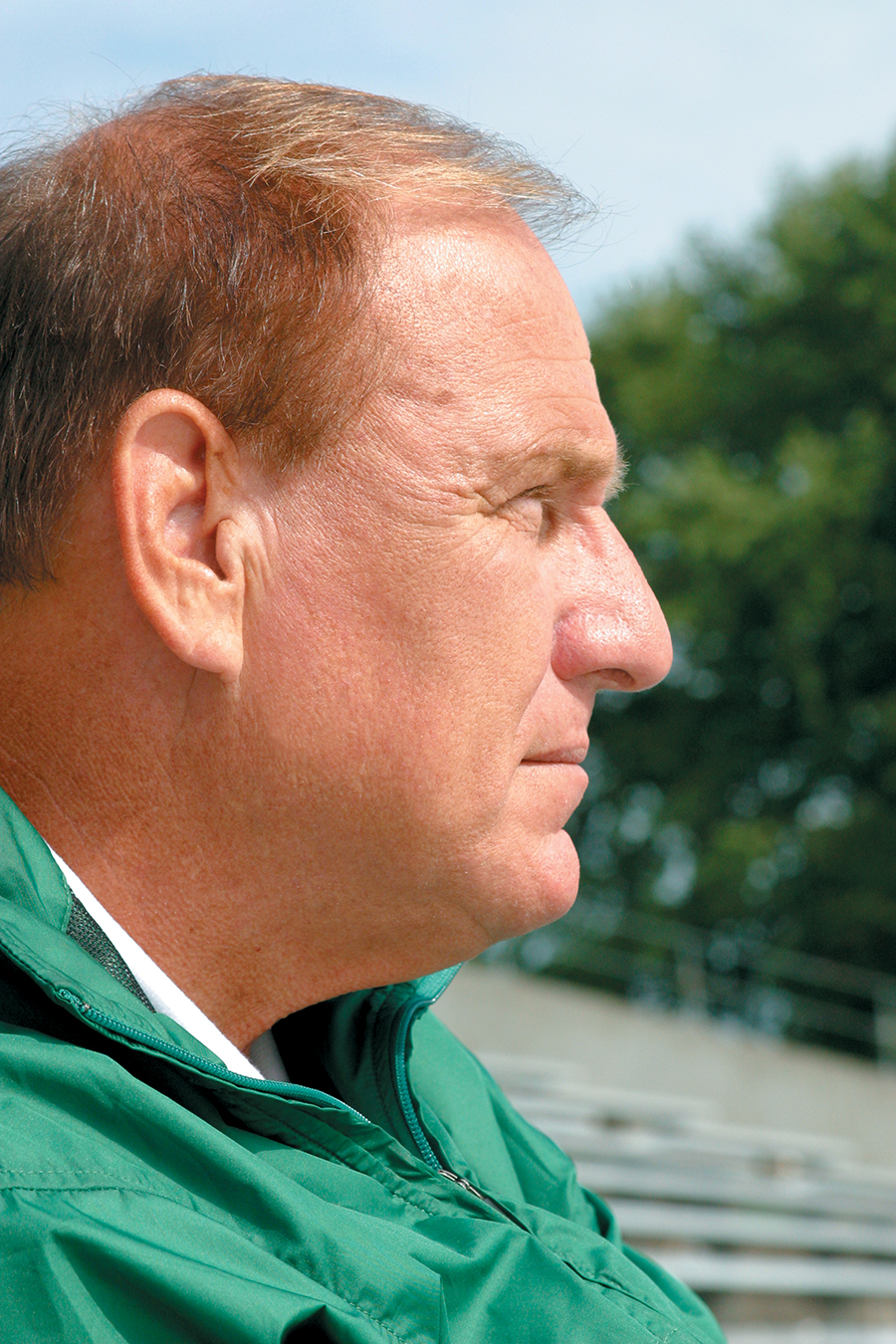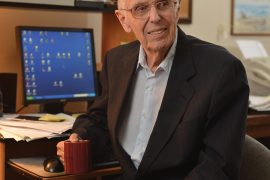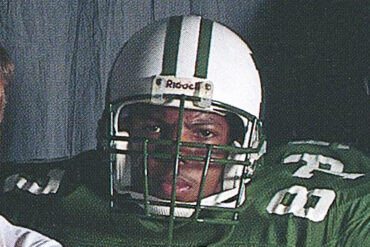There’s more to Bob Pruett, the winningest coach in college football today, than meets the eye. See why fans and peers alike say the good ol’ boy from East Beckley is one of the most revered icons in Herd history.
By Tim Stephens
HQ 52 | SUMMER 2004
Those who know him say mere statistics can’t define what Bobby Pruett means to Marshall University, to Huntington and to West Virginia.
Yes, the numbers are impressive – an 88-17 record, a national championship, two perfect seasons, three Heisman Trophy candidates, a trio of NFL first-round draft choices, five bowl victories, six conference titles – and on and on.
Such records simply are a part of what makes Pruett, the football coach, as popular as any figure in Marshall’s history. The attributes that can’t be looked up in the media guide are what makes Pruett the man the most revered individual in Herd Nation.
There is no substitute for winning, but other Marshall coaches have won and not been nearly as popular as is Pruett, whose humor puts fans at ease around him.
“You don’t have to be a jerk to be a football coach,” Pruett said, genuinely befuddled that a coach would go about his business with a sour, confrontational, even paranoid attitude as some have.
When it comes to Pruett, though, life is about more than just popularity. The veteran coach is known for his work in the community, but the public knows but a sliver of how much Pruett actually does quietly, behind-the-scenes, without fanfare so many major college coaches feed upon.
“Every year Coach Pruett comes and speaks for us,” said John Pinkerman of Boy Scouts of America. “Every year he hands me a check and jokes that I invited him to speak and it only cost him X amount of dollars. He’s done so much for us I can’t even remember it all.”

That’s Pruett. The organizations, charities and ministries for which he volunteers and supports financially number in the dozens and he is a cheerful giver. Yet, Pruett doesn’t just throw money. Pruett often speaks of “character.” If the true measure of character is what a person will do for someone who can’t do anything for him, Pruett defines the word in total.
He gets involved and not just on the organizational level. In 1996, when a friend who had adopted three boys days earlier stopped by for a visit, bringing the youngsters along to see Marshall Stadium, Pruett rushed to his office, got the boys MU football T-shirts and ushered them on to the field to participate in his football camp, free of charge. A faithful member of Fifth Avenue Baptist Church, hospital and school visits are commonplace for Pruett, who publicly speaks of his faith, a fact that Tri-State Christians have noted.
“The good Lord has blessed us,” Pruett said. “I have so much to be thankful for. In football, faith is important. You have to have faith in each other, in your coaches, in what you’re trying to do. Sometimes you can’t always see it, but that’s like the Lord. We know he’s there, even though we can’t see him.”
Pruett’s faith has helped him land several recruits through the years, including former wide receiver Demetrius Doss.
“When we sat down to eat, Coach Pruett prayed before he ate,” said Doss, whose mother is an ordained minister. “And you could tell it was genuine, it wasn’t just something for show. My mom would know if it was. That impressed me. I knew he was a good man.”
While some coaches are protective of their programs to the point of being competitive with other sports in their own universities, Pruett isn’t. He continually talks up Marshall’s other programs, inviting coaches of other sports to speak at the weekly Quarterback Club meetings. Often, Pruett and wife Elsie can be spotted in the crowd at a Marshall basketball, softball or baseball game.

“Bobby’s done a great job being far more than a football coach,” MU Athletic Director Kayo Marcum said. “We think he’s committed to Marshall.”
Committed indeed. Pruett has had offers to coach elsewhere, including in the NFL, since coming to Marshall in 1996. While he maintains the “never say never” attitude that most, if not all, coaches adhere to, Pruett turns down nearly all inquiries from schools looking to lure him away from the Herd.
“Beauty is in the eyes of the beholder,” Coach Pruett said. “From where I’m looking at it, it looks pretty. Until we see something more attractive to us than what we’ve got, I don’t see any sense in changing. When you spend 30 years trying to get somewhere, why go somewhere else?”
Pruett, 60, has a genuine love for Marshall, from which he graduated in 1965 after a stellar career as an end. Pruett returned as an assistant to Sonny Randle in 1979 before leaving for Wake Forest in 1983. Even as he was leaving, Pruett was plotting his return as head coach of the Thundering Herd. When, and even if it would happen, Pruett didn’t know. What he couldn’t deny was his desire to be the head football coach at his alma mater. That love of MU was what set him apart from other Herd coaches, coaches whom fans liked, but not to the level that they love Pruett. For Pruett, Marshall wasn’t a stepping stone. It is home.
“Sometimes the grass looks greener, but it isn’t,” Pruett said, a sentiment that delights fans who, justified or not, felt betrayed by coaches who left Marshall after a few seasons of success. Stan Parrish came to Marshall in 1984, gave the program its first winning season in 20 years, won again in 1985, then left for Kansas State, where he was fired four years later after being unable to turn around one of the nation’s most dismal programs. George Chaump followed Parrish and led MU to two NCAA Division I-AA playoff appearances, including the 1987 national championship game, before heading to Navy, where he was let go after failing to win there. Jim Donnan replaced Chaump in 1990 and guided Marshall to five playoff appearances, including a national championship in 1992, before leaving to coach at Georgia. Donnan was fired from that job.
Pruett is a Marshall man who wants to remain a Marshall man.

“This is a job I wanted since I left Marshall in 1965,” Pruett said. “That’s why I came back as an assistant. This was a dream of mine. I feel very appreciative I’ve been allowed to fulfill that.”
Pruett’s loyalty was severely tested in 1999 when the University of Houston came calling and offered a contract that was financially overwhelming. Houston’s offer dwarfed Pruett’s salary at Marshall. The perks alone were worth millions. Pruett seriously considered the job, but turned it down.
The next spring, Pruett attended the dedication of a CSX locomotive painted in Marshall’s colors, with MU emblems. A speaker there said, “I’ll bet Houston wouldn’t have given you a locomotive.” Pruett quipped, “No, but I probably could’ve afforded to buy one.” The crowd of hundreds roared with laughter, a typical response to Pruett’s wry sense of humor.
Pruett cherishes the cheers of 30,000 avid fans, but also values the laughter of an individual. Frequently during football practice, Pruett slips into the stands to offer a joke to fans who stop by to see the Herd work out. One of his favorite targets is his minister, Dr. Allen Reasons.
“Dr. Reasons is twice as good as our former pastor, R.F. Smith,” Pruett told a gathering of fans at a Quarterback Club meeting. “It took R.F. 20 minutes to put me to sleep. Allen can do it in 10.”
In March, Pruett spoke at a Fellowship of Christian Athletes function and sat with Reasons, who delights in trading barbs with the coach. Pruett asked the crowd of about 450 people to stand, then asked them to “put your hands together for this great evening.” The crowd complied, not knowing it had been duped until Pruett revealed that he had bet Reasons he could get a standing ovation.

Pruett is at his best at Quarterback Club meetings, where he unleashes his wit at will. During one of his first meetings in 1996, Pruett’s cell phone rang. “Must be Don Nehlen,” Pruett said, referring to the former West Virginia University football coach. “He’s calling to say he wants to play us in Huntington.” The crowd burst into laughter.
Pruett, though, appreciates a good retort. At another QB Club function, Pruett for several minutes kidded a newspaper reporter, feigning that he often was misquoted. “When I pick up the paper, I don’t know what’s going to be in it,” Pruett said. The reporter kiddingly shot back, “Wait until you see what’s in it tomorrow!” The crowd laughed, none more so than Pruett.
Quickness is an asset in football and in wittiness. As Marshall’s team left the bus before the 1999 season opener at Clemson, a Tigers fan yelled, “You’re not playing Furman this time.” Without hesitation, Pruett shot back, “I hope they’re not THAT good.” Marshall went on to beat Clemson 13-10 that day and rolled to a 13-0 record and a No. 10 national ranking.
The offensive coordinator at Clemson that day was Rich Rodriguez, now head coach at West Virginia University and the good-natured subject of Pruett’s occasional barbs. Pruett and Rodriguez have a good relationship and the Mountaineers coach said he can relate to the Herd mentor, as he, too, spent his career looking to return as head coach at his alma mater.
“Coach Pruett’s a West Virginia native like myself and he’s comfortable where he is,” Rodriguez said. “He knows and understands the Marshall program and he’s built it into something special, into something so that it’s where he wants to stay.”
And Marshall wants to keep Pruett. His contract extends through 2010.
“We’re very proud of the unparalleled success that Coach Pruett is having on and off the field,” said Menis Ketchum, chair of the Marshall Board of Governor’s athletic committee. “We’re delighted to have him as our head football coach through 2010.”
The university bestowed a Distinguished Alumni Award on him, something most football coaches don’t receive. University officials, though, see Pruett as more than a coach or an ambassador. He is viewed as an outstanding teacher.
“Football is a metaphor for life,” Pruett said. “What we teach on the football field is something that carries over into life after college, into every day life.”
The message gets through.
“I admire him,” said former MU cornerback Melvin Cunningham, now a high school coach in Florida. “He taught us a lot on and off the field.”
The main subject, football? No. Character? Yes.
“He always was on us about that,” said MU former tackle Nate McPeek. “He stressed how important character is, about how we needed to think about what we were doing. He was kind of redundant at times, but that was good. He drilled that into us.”
Jane McKee, associate dean for academic programs in Marshall’s College of Education and Human Services, is a fan of Pruett’s teaching abilities.
“Just like the master teacher that he is, Coach Pruett always sees the potential in every situation,” McKee said. “He always maximizes the talent and minimizes the possibilities for failure. He finds ways for his coaches and players to win on and off the field.”
Pruett has earned the admiration even of a very skeptical media. “Bobby Pruett easily is Marshall’s most successful, therefore its greatest football coach,” said Ernie Salvatore, longtime columnist with The Herald-Dispatch. “It’s unfair to compare eras because everything was so different, but you can’t argue with his success.”
Pruett’s success has transcended the Mid-American Conference, with victories over notable teams such as Kansas State, which made a remarkable rebound to No. 6 in the nation since the days when Parrish coached there. Other victims include South Carolina, BYU, Louisville, Cincinnati, East Carolina and others. Pruett modestly deflects credit to his staff and players.
“I’m just an old boy from East Beckley,” Pruett drawls. Those who know Pruett have none of that.
“When Marshall came into the MAC in 1997, I knew what kind of coach we were getting coming in,” said Wake Forest coach Jim Grobe, former coach at Ohio and a member of the MU staff under Randle. “I knew we’d let the fox into the henhouse.”
Dave Diles knew, too. The veteran ABC sportscaster from Pomeroy, Ohio, knew Pruett for years.
“Bobby comes into the league in ‘97 saying he just hoped his team could be competitive,” Dials said. “Shoot. I knew how good they were, how good he was. I knew what he was doing. He’s too good of a coach.”
Pruett is renowned for his halftime adjustments that turn apparent defeats into victories. The most memorable came in the 2001 GMAC Bowl, where the Herd rallied from a 38-8 halftime deficit to win 64-61 in double overtime.
“I told our guys it was a long walk from Mobile, Ala., to Huntington,” Pruett quipped.
Perception is that Pruett has all the advantages – best stadium, best talent, most money, etc. If the Herd has the best talent in the MAC, it’s because Pruett and his staff recruited it. Marshall’s stadium ranks among the best in the MAC, but it lacks the overall football training facilities of many other league schools. And, Marshall’s funding is far from that of most other MAC programs.
“He’s one of those rare coaches who outcoaches his resources,” Marcum said. “Recruiting and staffing are big factors. He recruits in places others ignore. He’s a players’ coach. He’s a father figure. He’s a down-home kind of guy. He tells it like it is, good or bad, and he knows how to do that. We’re fortunate to have him at Marshall University.”
Fortunate indeed. Today Pruett is the winningest coach in college football, but the good ol’ boy from East Beckley remains humble. In truth, he is completely unaware of just how much of a phenomenal impact he has made not only on the football program at Marshall, but on the community as well. He truly is a legend in the making.




